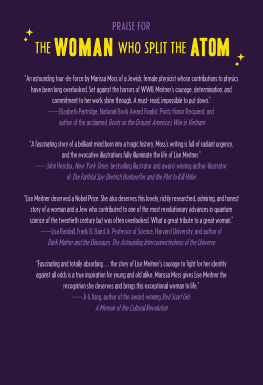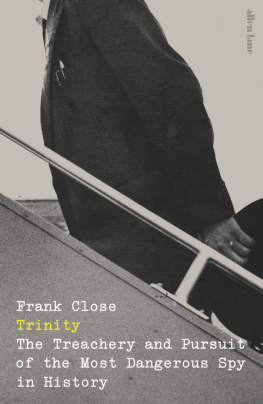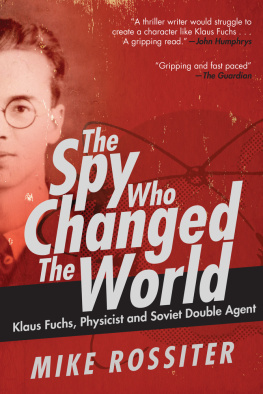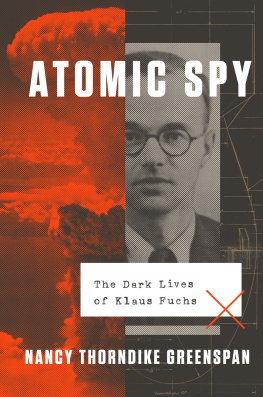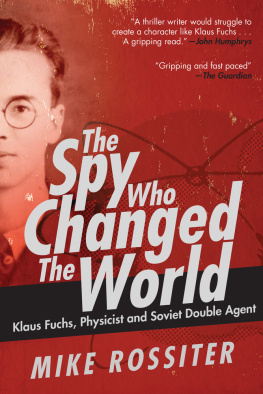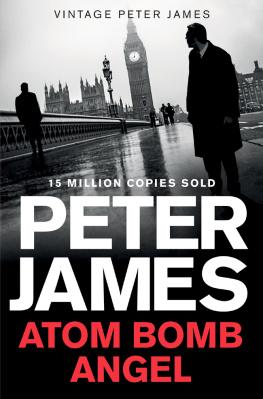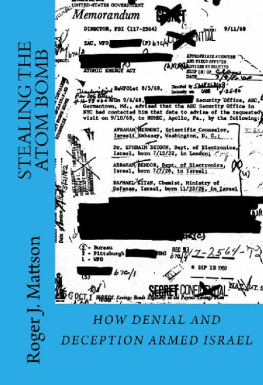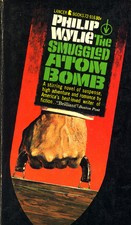Norman Moss - Klaus Fuchs: The Man Who Stole the Atom Bomb
Here you can read online Norman Moss - Klaus Fuchs: The Man Who Stole the Atom Bomb full text of the book (entire story) in english for free. Download pdf and epub, get meaning, cover and reviews about this ebook. year: 1987, publisher: St Martins Pr, genre: History. Description of the work, (preface) as well as reviews are available. Best literature library LitArk.com created for fans of good reading and offers a wide selection of genres:
Romance novel
Science fiction
Adventure
Detective
Science
History
Home and family
Prose
Art
Politics
Computer
Non-fiction
Religion
Business
Children
Humor
Choose a favorite category and find really read worthwhile books. Enjoy immersion in the world of imagination, feel the emotions of the characters or learn something new for yourself, make an fascinating discovery.

- Book:Klaus Fuchs: The Man Who Stole the Atom Bomb
- Author:
- Publisher:St Martins Pr
- Genre:
- Year:1987
- Rating:3 / 5
- Favourites:Add to favourites
- Your mark:
- 60
- 1
- 2
- 3
- 4
- 5
Klaus Fuchs: The Man Who Stole the Atom Bomb: summary, description and annotation
We offer to read an annotation, description, summary or preface (depends on what the author of the book "Klaus Fuchs: The Man Who Stole the Atom Bomb" wrote himself). If you haven't found the necessary information about the book — write in the comments, we will try to find it.
Klaus Fuchs: The Man Who Stole the Atom Bomb — read online for free the complete book (whole text) full work
Below is the text of the book, divided by pages. System saving the place of the last page read, allows you to conveniently read the book "Klaus Fuchs: The Man Who Stole the Atom Bomb" online for free, without having to search again every time where you left off. Put a bookmark, and you can go to the page where you finished reading at any time.
Font size:
Interval:
Bookmark:
Klaus Fuchs
The Man Who Stole the Atom Bomb
Norman Moss
Norman Moss 1987
First published in Great Britain by Grafton Books in 1987.
This edition published by Sharpe Books in 2018.
Contents
Chapter One
In the spring of 1942 the war in Russia was nearing the end of its first year. The savage Russian resistance and the equally savage Russian winter had dashed Hitlers hopes of a quick blitzkrieg victory over the Soviet Union to follow those in the West, and littered the landscape with the frozen wrecks of thousands of German tanks, trucks and artillery pieces, and the frozen bodies of tens of thousands of German soldiers. The invaders were being pushed back from the approaches to Moscow, and war was raging along a 4,500-mile front. Now Soviet armies were girding themselves to meet the next German offensive, and the Soviet Government was mobilizing industry and population for a prolonged and bitter struggle that would tax the nations resources to the utmost.
One day in April, the Soviet Foreign Minister, Vyacheslav Molotov, called the Minister for the Chemical Industry, Mikhail Pervukhin, into his office. He handed Pervukhin a file containing intelligence reports of work that was going on in secret in Western countries on a new kind of weapon, a uranium bomb, that would explode by releasing the energy locked inside the atom. Molotov said he was giving him this file on the instructions of Stalin himself. He told Pervukhin to consult scientists knowledgeable in this field, and determine what action, if any, should be taken in the light of these reports.
Pervukhin did so. Soviet atomic physicists, like their counterparts elsewhere, were aware by now that the creation of an explosion by atomic fission was theoretically possible. The reports in this file showed that it was a practical possibility as well. The scientists gave their advice, and Pervukhin reported to Stalin. Within months a laboratory was set up to work on atomic fission, scientists were taken off other war work to staff it, and the Soviet atomic bomb programme was under way.
The principal contributor to these files, sending back reports via a Soviet agent in Britain, was a pale, bespectacled, unusually taciturn physicist who had been brought up always to do what his conscience told him to, Klaus Fuchs.
A little while after this, in the summer of 1944, on a Saturday afternoon, Klaus Fuchs was driving through Santa Fe, New Mexico. He had on the seat beside him a large envelope containing data on the atomic bomb that was being built in secret at Los Alamos, some thirty miles from the city. This project was the best-kept secret of the war, and the most important secret in the world. But the envelope he had with him was a virtual information pack on the bomb, containing descriptions, calculations, figures, and even a scale drawing.
Fuchs stopped the car on an avenue with overhanging trees that provided some shade from the burning southwestern sun, and looked around for a familiar figure. He saw him almost at once, a medium-built, pudgy-faced man with thick glasses. The man got into the car, and Fuchs drove a short distance and parked, and the two of them talked. Then Fuchs handed the man the envelope; the latter got out and walked away, and Fuchs drove off. The man went to the bus station, to wait for the next bus to Albuquerque, where he was to make a call the next day on a US army sergeant.
***
If ever a man was his fathers son, it was Klaus Fuchs. This is not to say that he was just like his father, for they followed very different careers, and Fuchs senior had some qualities which his son Klaus conspicuously lacked. But the mainsprings of Klaus Fuchss action can be seen in his fathers life and deepest beliefs.
Emil Fuchs was a clergyman in the Lutheran Church, the church that claims direct descent from the man who most effectively raised the banner of individual conscience against the claims to spiritual authority of the Roman Catholic Church. Indeed, the principles that Klaus Fuchs followed, and his justification to himself for betraying his oath of allegiance to his adopted country, can be traced right back to Martin Luthers famous statement of defiance to the Diet of Worms in 1521: I do not accept the authority of popes and councils My conscience is captive to the word of God.
The mainstream of the Lutheran Church has always taken good care to render unto Caesar the things that are Caesars; it has accepted the temporal authority of the state, as Luther himself did, and has tended to be conservative. Emil Fuchs was one of a radical minority, ready to challenge injustices perpetrated by the state in the name of Christian values. He was a Socialist for most of his life, and a brave opponent of Nazism.
Like Luther, like the heroes of Protestantism, he was ready to follow the dictates of his conscience whatever others said, and whatever the consequences. His moral priorities are seen in a passage in a pamphlet he wrote, Christ in Catastrophe, recalling some of his fears as the father of a family during the early Hitler years: People who fell into Nazi hands were treated with great cruelty, and I was in great anxiety. One night I nearly went mad. I saw my children cruelly killed, lying before me, and in this hour of utter despair, I heard a voice saying: What do you want? Shall they keep their lives by losing their conscience? Peace came to me.
His religious beliefs changed during the course of his life. He wrote later of spiritual struggle, and wrestling with questions. This kind of travail is inherent in the Protestant doctrine, and accounts of tormenting inner struggles run through the writings of the great figures of Protestantism, including Luther himself. For if one has to find the answer to moral and spiritual questions in oneself rather than in any outside authority, it is sometimes difficult to distinguish the voice of God from that of the Devil, of true morality from proud error. A battle rages inside the head. It raged inside his, and it was to rage inside his sons.
As a young clergyman, Emil Fuchs went to Manchester to be the pastor to a German congregation there, and he learned to speak English. He became concerned at the condition of industrial workers in city slums, and he retained this concern when he went back to Germany. He worried that his church was not doing enough to reach these people. He started weekly discussions in his home on religious and social issues, mainly for industrial workers, Christian or not, and these continued for several years. A short, tubby man, he had a warm, outgoing personality that enabled him to establish relationships with many different kinds of people.
He joined the Social Democratic Party, the SPD, in 1912, one of the few clergymen to do so. He identified Christianity with the poor and deprived, and refused to separate the Christian mission from the political struggle for social betterment, and against militarism.
Later he became a Quaker, and in the years after World War II he spent some time with Quakers in America and Britain. Some of these who met him testify to his strength of mind and the warmth of his personality, as well as the evident intensity of his faith. One man said, I didnt see a lot of him I only met him a few times but I felt I knew him. There are people you can spend ten minutes with and feel youve spent the whole day with them. Emil Fuchs was one of these. Interestingly, people were to say precisely the opposite about his son Klaus: that they could spend days with him, and not know him at all.
Klaus Fuchs was born on 29 December 1911 in the village of Rsselsheim, near Frankfurt, where his father was the local clergyman. He was born at the end of the twenty-eighth year of the reign of Kaiser Wilhelm II, into a stable German society that would vanish before he reached adulthood. He was christened Emil Julius Klaus Fuchs, but used only the last of his Christian names. He was the third of four children. There was an elder brother, Gerhardt, a sister Elizabeth, and then, after Klaus, a younger sister, Kristel.
Next pageFont size:
Interval:
Bookmark:
Similar books «Klaus Fuchs: The Man Who Stole the Atom Bomb»
Look at similar books to Klaus Fuchs: The Man Who Stole the Atom Bomb. We have selected literature similar in name and meaning in the hope of providing readers with more options to find new, interesting, not yet read works.
Discussion, reviews of the book Klaus Fuchs: The Man Who Stole the Atom Bomb and just readers' own opinions. Leave your comments, write what you think about the work, its meaning or the main characters. Specify what exactly you liked and what you didn't like, and why you think so.

